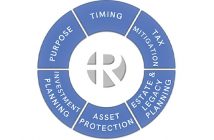The Future of Social IN-Security
Once upon a time people retired at the age of 65 and received a gold watch after spending many years working diligently for the same company. They had a reasonable expectation that they could live out their remaining 12 to 15 years comfortably, thanks to their pension, Social Security and a steady flow of dividends and interest from safe, conservative stocks and bonds. No more! What has changed? In the past Social Security was considered a sure thing. Today we face potential cutbacks and many call our government allowance Social Insecurity. What was intended as a safety net has morphed into an entitlement program. The very foundation of the Social Security system is cracked.
This crack will not disappear, but will only grow larger and more dangerous. If any company were operating on the same basis as the current Social Security program, it would have been put out of business years ago. The fundamental problem lies in the fact that when Social Security was started in 1935, it was intended to provide only a supplemental retirement income source to a minority of Americans. Today, as we are retiring earlier and living longer, it has instead become the primary retirement income source for a majority of retired Americans. Social Security provides at least half of the retirement income for two out of every three Americans. Those aged 85 and older receive 80 percent of their income from Social Security. Some 56 million people collect Social Security benefits, and that is projected to grow to 91 million in 2035. In 1950, 16.5 people in the work force funded the system for every benefactor. Today fewer than three people fund every benefactor. ¹
The Social Security Administration estimates its shortfall at $8.6 trillion. That means the agency would need to invest $8.6 trillion today, and have that investment pay returns of 2.9 percent above inflation for the next 75 years to produce enough money to cover the shortfall. The system is truly overburdened and running out. The next time you receive your social security statement in the mail, take the time to read the fine print on the front page.
Clearly, not even the government is sure about how Social Security is faring. Indeed, both statements could be correct. Either way, the conclusions point to a shortfall should Congress not be able to agree on how to overhaul the program.“We need to resolve these issues soon to make sure Social Security continues to provide a foundation of protection for future generations,” concludes Social Security’s Acting Commissioner Carolyn W. Colvin. Of course, we’ve all seen Congress dismal record when it comes to bi-partisan action. The simple conclusion you might want to draw? Social Security is not as robust as it once was and can no longer be counted on as a given when calculating your retirement income.
That’s just the start when it comes to financial insecurity during your retirement years. Many companies have replaced defined benefit pension plans with defined contribution plans that do not offer the same degree of assured income. Pension plans have been phased out and the shift from traditional pensions to 401(k)s has made retirement a riskier prospect because retirees must now manage their investments and control spending on their own. Retirees were certainly startled in 2008 when they witnessed their holdings inside their retirement accounts plummet. Fortunately the markets have experienced significant growth since then and have even hit new records, but now bond yields have hit rock bottom and CDs are only offering negligible returns. With an estimated 10,000 people retiring a day, it’s no wonder that the primary concern among many retirees is simply making ends meet.
Now What?
To say we are currently facing a great deal of economic uncertainty is undoubtedly an understatement. With so much now out of our control, it is all too common today to meet people who despite having accumulated significant wealth still have grave concerns about how uncertain their financial future seems to be. Much of the talk on Wall Street as well as what we read in the media tends to focus on the current challenges, negative statistics and high emotions we are experiencing. We can all benefit by facing our present circumstances with as much information as possible about the strategies that can help mitigate the financial risks we run. Whether you are at or near retirement, you must plan for financial independence now more than ever before.
David Rosell is President of Rosell Wealth Management in Bend. www.RosellWealthManagement.com. He is the author of Failure is Not an Option- Creating Certainty in the Uncertainty of Retiremen and his latest book Keep Climbing─ A Millennial’s Guide to Financial Planning. Learn more about his book at www.DavidRosell.com. Ask for David’s book at Newport Market, Cafe Sintra, Bluebird Coffee Shop, Dudley’s Bookshop, Roundabout Books and Sunriver Resort. E-Books can be purchased online at or Amazon.com or Barnes & Noble.
Investment advisory services offered through ValMark Advisers, Inc. an SEC Registered Investment Advisor
Securities offered through ValMark Securities, Inc. Member FINRA, SIPC 130 Springside Drive, Ste 300 Akron, Ohio 44333-2431. 800-765-5201. Rosell Wealth Management is a separate entity from ValMark Securities, Inc. and ValMark Advisers, Inc.
¹ Social Security Department





